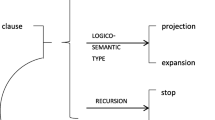Abstract
In the case of some languages, such as English, when a complex sentence consists of a main clause and a subordinate clause, these two clauses are joined together by either a subordinate ‘completive’ conjunction (that, so that), a circumstantial conjunction (when, before that, while) or a relative pronoun (who, that), e.g. “Because Mom said so, I talked to María”. The subordination in Quechua is induced by a morpho-syntactic marker, applied to the dependent verb of the sentence (e.g. chayta mamai niptin, Mariata rimarqani/ it’s because my mother said that, I talked to María), where the suffix -ptin marks the causative circumstance ‘because’.
The case of participial relative clauses was partially studied by W.F.H. Adelaar, In this paper, I complement his work by proposing new methods to formalize the clause-subordination based on the verbal suffixes {-pti, -spa, -stin}.
I have constructed specific grammars to obtain paraphrases of the sentences containing an adverbial subordinate clause. A few instances of transformations are also presented to illustrate how Quechua sentences containing a dependent clause can be translated into French.
Access this chapter
Tax calculation will be finalised at checkout
Purchases are for personal use only
Similar content being viewed by others
Notes
- 1.
A canonical QU sentence is a simple sentence (no subordinates), assertive (declarative: no questioning, etc.), neutral on all levels (not negative, without highlighting procedures…), with the words in the simplest order, the most characteristic of their function. That order is: subject - object (complement (s))/attribute) – verb.
- 2.
Inflected GER1 endings: (spa-i, spa-iki, spa-n, spa-nchik, spa-iku, spa-ikichik, spa-nku).
- 3.
Note: It contains however many duplicated outputs.
References
Adelaar, W.: Participial clauses in Tarma Quechua. Subordination in native South American languages. Edited by: Van Gijn, Rik; Haude, Katharina; Muysken, Pieter. University of Zurich Main Library, Zurich (2010)
Ben, A., Fehri, H., Ben, H.: Translating Arabic relative clauses into English using the Nooj platform. ln: Monti, J., Silberztein, M., Monteleone, M., di Buono, M.P. (eds.) Formalizing Natural Languages with Nooj 2014, pp. 166–l74. Cambridge (2015)
Cole, P., et al.: Headless relative clauses in Quechua. Int. J. Am. Linguist. 48(2), 113–124 (1982)
Duran, M.: Formalizing Quechua verbs Inflexion. In: Proceedings of the NooJ 2013 International Conference, Saarbrücken (2013)
Duran, M.: The annotation of compound suffixation structures of Quechua verbs. In: Okrut, T., Hetsevich, Y., Silberztein, M., Stanislavenka, H. (eds.) NooJ 2015. Communications in Computer and Information Science, vol. 607, pp. 29–40. Springer, Cham (2016). https://doi.org/10.1007/978-3-319-42471-2_3
Duran, M.: Dictionnaire électronique français-quechua des verbes pour le TAL. Thèse doctorale. Université de Franche-Comté, Paris (2017)
Hastings, R.: The interpretation of Cuzco Quechua relative clauses. University of Massachusetts Occasional Papers in Linguistics, vol. 27 (2001)
Langella, A.M.: Paraphrases for the Italian communication predicates. In: Barone, L., Monteleone, M., Silberztein, M. (eds.) NooJ 2016. CCIS, vol. 667, pp. 196–207. Springer, Cham (2016). https://doi.org/10.1007/978-3-319-55002-2_17
Muysken, P.: Relative Clause Formation in Ecuadorian Quechua, manuscript, Otavalo, Ecuador (1976)
Rios, Annette. Esquema de anotaciones sintácticas para el Quechua Sureño (2014). www.cl.uzh.ch/dam/jcr:ffffffff-d043-9c87-ffff-ffffb112cc62/TR_2014_01.pdf
Silberztein, M.: Automatic transformational analysis and generation. ln: Gavriilidou, Z., Chatzipapa, E., Papadopoulou, L., Silberztein. M. (eds.) Proceedings of the NooJ 2010 International Conference and Workshop, pp. 221–231. University of Thrace, Komotini (201l)
Silberztein, M.: Language Formalization: The NooJ Approach. Wiley, Hoboken (2016)
Weber, D.: Relativization and Nominalized Clauses in Huallaga Quechua. University of California Publications in Linguistics, vol. 103. University of California Press, Berkeley (1983)
Author information
Authors and Affiliations
Corresponding author
Editor information
Editors and Affiliations
Rights and permissions
Copyright information
© 2022 Springer Nature Switzerland AG
About this paper
Cite this paper
Duran, M. (2022). Formalization of Transformations of Complex Sentences in Quechua. In: González, M., Reyes, S.S., Rodrigo, A., Silberztein, M. (eds) Formalizing Natural Languages: Applications to Natural Language Processing and Digital Humanities. NooJ 2022. Communications in Computer and Information Science, vol 1758. Springer, Cham. https://doi.org/10.1007/978-3-031-23317-3_7
Download citation
DOI: https://doi.org/10.1007/978-3-031-23317-3_7
Published:
Publisher Name: Springer, Cham
Print ISBN: 978-3-031-23316-6
Online ISBN: 978-3-031-23317-3
eBook Packages: Computer ScienceComputer Science (R0)




